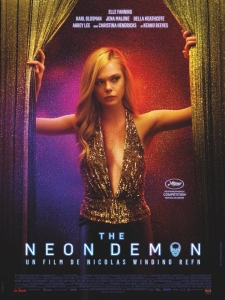 “Am I staring?” In these first few lines of “The Neon Demon,” Director Nicolas Winding Refn’s invitation to stare gives his latest film both its perverse pleasure and questionable subtext. With “Drive” and “Only God Forgives,” Refn’s films have long been a combination of the violent and tantalizing. So it’s natural that the Danish director would make “The Neon Demon,” a psycho-horror art house drama about beauty and the grotesque pursuit of perfection. And while it works as stunning exploitation cinema, it’s perhaps less so as a comment on the fashion world it’s depicting.
“Am I staring?” In these first few lines of “The Neon Demon,” Director Nicolas Winding Refn’s invitation to stare gives his latest film both its perverse pleasure and questionable subtext. With “Drive” and “Only God Forgives,” Refn’s films have long been a combination of the violent and tantalizing. So it’s natural that the Danish director would make “The Neon Demon,” a psycho-horror art house drama about beauty and the grotesque pursuit of perfection. And while it works as stunning exploitation cinema, it’s perhaps less so as a comment on the fashion world it’s depicting.
Elle Fanning plays Jesse, an all-natural 16-year-old model from the Midwest with that “deer in the headlights look” because it’s exactly what they’re looking for. In her first photo shoot, she’s sprawled on a chair in a luxurious gown with fake blood dripping from around her neck and torso. Immediately there’s a sexual quality to the way she wipes away the blood to reveal her youth, and of course the rival models she meets in dark, neon-lit night club bathrooms certainly have a blood-sucking, vampire quality.
The older models ask her what kind of lipstick she wears. One wears “Redrum,” while another’s is called “Fuck Off,” but for Jesse, she gets one named after a dessert, “because she’s so sweet.” But Jesse’s vice is her own perfection. Whereas all the other models have already had work done to keep them looking immaculate, the cold, calculating eyes of one woman within the modeling agency (Christina Hendricks) or the blank stare of the top photographer (Alessandro Nivola) all see right past them.
Of course the judging doesn’t stop at lipstick. One girl comments that whenever another beautiful woman enters the room, the first question that pops into mind is, “Who is she fucking, and can she climb higher than me?” Feminists may seriously raise an eyebrow at that statement, and for good reason. Is Refn critiquing this intense superficiality, does he believe it exists among women of this world, or is this a commonality? It’s hard to tell in a movie so lush and specifically enraptured by style, color and sexuality.
“Drive” and “Only God Forgives” have dazzling cinematography, but “The Neon Demon” in particular makes every frame look like a photograph. Refn places Fanning in a soft blue gown in front of a white infinity backdrop and in the next moment will bathe the room in lens flares and garish patterns. It’s equal parts Gothic Horror, Neo-Noir and Sci-Fi whenever it sees fit.
Although “The Neon Demon” in part feels fun because it is so inconsistent and wild. “Only God Forgives” was plain lifeless, and this film by comparison has a bizarre sense of humor. Keanu Reeves plays Hank, the motel clerk where Jesse lives, and he can alternatively get some laughs and screams trying to capture a cougar that found its way into Jesse’s room. Refn even goes all out on the sexuality front, with Jena Malone as a jealous makeup artist bravely putting herself in the most compromising situation imaginable.
Refn though may still have crossed a line. “The Neon Demon” gets more sickening and disturbing as the other women slowly devour Jesse’s beauty, figuratively and literally, and that shock value quickly goes out of fashion.
3 stars